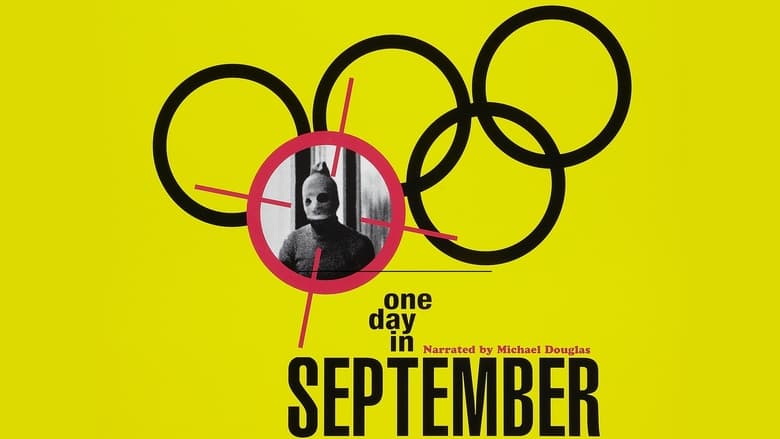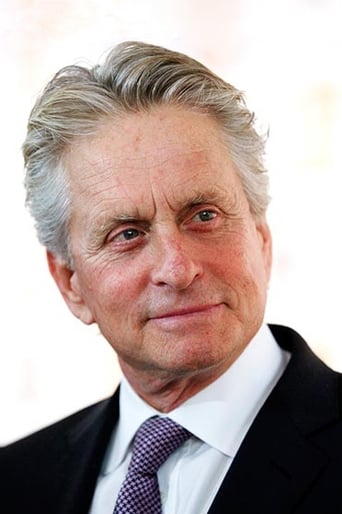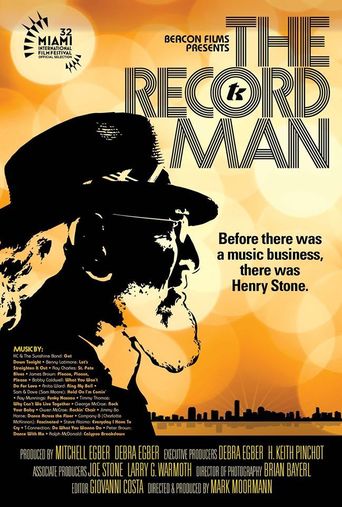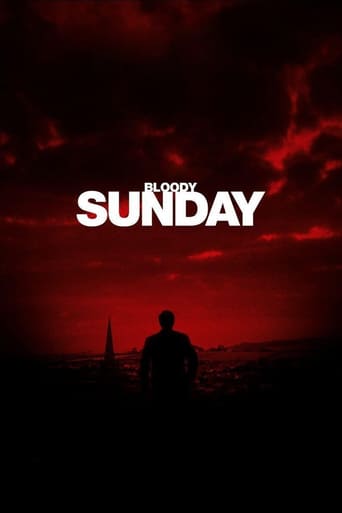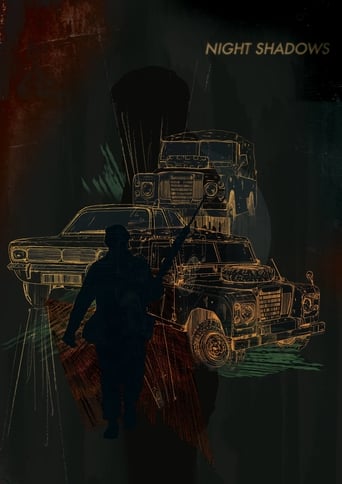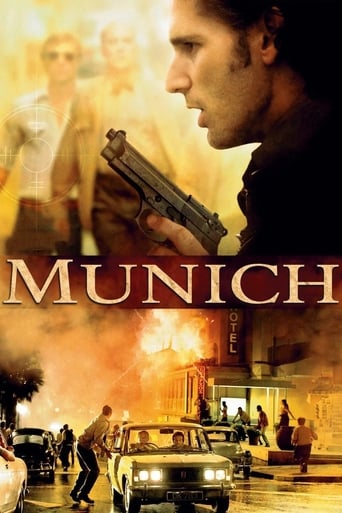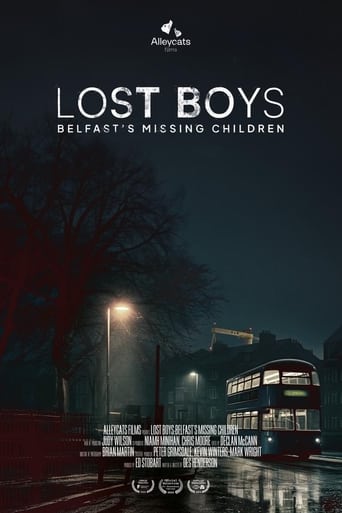One Day in September (1999)
The full story of the 1972 Munich Olympics Massacre and the Israeli revenge operation 'Wrath of God.' The 1972 Munich Olympics were interrupted by Palestinian terrorists taking Israeli athletes hostage. Besides footage taken at the time, we see interviews with the surviving terrorist, Jamal Al Gashey, and various officials detailing exactly how the police, lacking an anti-terrorist squad and turning down help from the Israelis, botched the operation.
Watch Trailer
Free Trial Channels
Cast


Similar titles
Reviews
I love this movie so much
An absolute waste of money
Very good movie overall, highly recommended. Most of the negative reviews don't have any merit and are all pollitically based. Give this movie a chance at least, and it might give you a different perspective.
This movie feels like it was made purely to piss off people who want good shows
What a frustrating experience.Interesting today, when you see a documentary entitled, "One Day in September," one thinks of 9/11.In fact, this was another September in 1972 with other innocent people killed.In 1972, Palestinian terrorists appeared at the 1972 Munich Olympics and took Israeli athletes hostages.Contributing to this documentary is one surviving terrorist, Jamal Al Gashey, who is in hiding. If you saw the film "Munich," which I recommend, you will see what happened to the other terrorists at the hands of the Israelis.This is a particularly anger-provoking documentary. There was minimum security at that Olympics so as not to upset the athletes. Okay. The Germans, of all people, did not have an anti- terrorist group, and their police were Keystone Cops.Israel offered to help, but they were turned down.In other words, any rescue attempt was ruined before it started.The Germans made lots of plans to rescue the athletes, and these were dutifully reported by the television press. Unfortunately, all the rooms holding the hostages had televisions, so the terrorists could see and hear about the plans before they happened.I did not feel that this documentary took sides, except in showing the incompetence of the Germans and the Olympics administration. The interview with Jamal Al Gashey was extensive, giving a play by play of what happened. He claimed there was no intention to kill the athletes. Well, they're dead.Worse yet, everyone was told that the final rescue attempt was successful and all of the hostages were alive, only for the families to find out later the news was incorrect. I can't get into a discussion of the Palestinian-Israeli conflict. I also have absolutely no intention of putting this heinous act into perspective, although the Palestinians have a viable point of view. I just don't think that was the way to address it. There is no perspective that justifies killing innocent people and holding them for ransom. The Israelis weren't going to give them anything -- if they did, no Israeli anywhere would have been safe.The Olympics make an attempting to further camaraderie among nations and bring people together. The wife of one of the victims gave a very poignant recitation, as did her daughter, who never knew her father.Sadly, in this world, there are many children who never knew their fathers, thanks to years and years of Middle East conflict. What's the answer? I don't even know the question.
Whether winter or summer, the Olympic Games are meant to be a place where the world comes together for the ultimate competition in athletics. It is the ideal that dates back to ancient times when the Greeks themselves invented the Olympics.But on September 5, 1972, in an ordeal that lasted into the early morning hours of the following day, the Olympic ideal was brutally attacked when members of a shadow Palestinian terrorist group known as Black September hopped over the fence at the Olympic Village in Munich and killed two Israeli athletes, holding nine others hostage and threatening to kill them unless their demands for freeing two hundred political prisoners were met. With Israel point-blank refusing to negotiate, and having to take responsibility for this, a rag-tag German hit squad unleashed their firepower on the terrorists at the Furstenfeldbruck airfield just outside of Munich; and although three of the eight terrorists were eventually captured and the other five died in the mêlée, so too did the remaining nine Israeli athletes. It was the first act of terrorism ever televised to an international audience; and in 1999, it was the focus of the Oscar-winning documentary ONE DAY IN September.Narrated by Michael Douglas, ONE DAY IN September examines, in a span of only ninety-one minutes, the way the 1972 Summer Olympics were laid out, and how it led to what took place. Munich was, just four decades before, the epicenter of the Nazi movement; and when it was awarded the '72 Games, memories of Hitler's 1936 Berlin Games, as well as the horrors of World War II and the Holocaust, were still fresh in the population's memories. The organizers of Munich '72 were determined to make it as different from "Hitler's Games" as was humanly possible; and while theirs were noble and good intentions, it turned out to be their undoing. The perimeter of the Olympic Village was a mere rusty fence, as opposed to sturdier materials like barbed wire (so as not to look like a concentration camp like Dachau, which was only seven miles away), and the security guards not only had no visible firearms on them, they didn't even look like security guards to begin with. This was how the eight Black September militants scaled the fence, with the unintentional help of drunk American athletes, and broke into the Israeli apartment at Connollystrasse 31. A great deal of negotiating between West Germany and Black September ensued, and the world was transfixed to their televisions, as they watched what had been up to that moment a peaceful Olympic celebration suddenly turned into the most overt act of terrorism the world had seen to that point.Attempts by the West German government to end the standoff by force were totally unsuccessful (the country had no counter-terrorism force of its own, and relied on municipal cops); and when the terrorists and the hostages were transported by helicopters to Furstenfeldbruck, the situation took the ultimate horrifying turn. A whole horde of untrained German snipers unloaded on the airfield; and over the next forty-five minutes, all hell broke loose. Once the mêlée was over, officials of the West German government and the Munich Olympic Committee had stated that the terrorists had been killed, but the Israelis had been saved. Later on, of course, it was revealed that something totally different had transpired. It was up to ABC sportscaster Jim McKay to deliver the terrible news to the world: "They're all gone." People who remember those terrible two days in September 1972 will certainly be reminded of them again when watching ONE DAY IN September; and those who only know of 9/11 will be reminded of how terrorism can turn good things bad in a hurry. The whole ordeal, down to the last horrifying battle at Furstenfeldbruck, was an act of well-meant but painfully inept West German planning; and while the decision to go on with the Olympic Games after the deaths may have been a way of both paying tribute to the murdered Israelis and thumbing its noses at terrorists, it was also extremely controversial. Scenes of athletic competition, including those of U.S. swimmer Mark Spitz and Russian gymnast Olga Korbut, are interspersed with the horrific events at Connollystrasse 31 to emphasize the tragic turn Munch '72 took in the span of only eighteen hours. The mood is emphasized further by Heffes' modern score, with contributions by Glass, and a performance of the Funeral March of Beethoven's Eroica Symphony, as performed by Rudolf Kempe and the Munich Philharmonic at the memorial for the athletes. In the end, ONE DAY IN September was richly deserving of the Oscar it got, and it should remind us all of how political terrorism not only poisoned the ultimate sporting event, but also led to far worse things to come.
One Day in September (1999) *** 1/2 (out of 4) Very good, Oscar-winning documentary taking a look at the tragic 1972 events at the Munich Olympic games where eleven Israeli athletes were taken hostage by Palestinian terrorists. Through interviews and archival footage we hear about the planning of the event, the taking of the athletes, the negotiations to have them freed and then the tragic events that led to their deaths. Outside some questionable uses of music, this is a pretty strong documentary that features some great interviews with many of the people on the scene. We get interviews with some of the police negotiators, family members of victims and most shockingly is the last living terrorist who for the first time talks about the operation. There have been quite a few documentaries on this subject but this one here is without question one of the most interesting because of the people that were interviewed. It's was great getting to hear from the people who were involved in the negotiations and of course it was interesting to hear from the last remaining terrorist. With narration from Michael Douglas, the film does a very good job at mixing the interviews with the archival footage and it really gives you a great idea of the events and everything that was going on. This is especially true when you see some live TV broadcasts and learn that this hurt the police because the terrorist were inside watching and seeing that a raid was about to happen, which caused the first rescue mission to be canceled. The blunders of the German police are also on full display and it's really shocking to see how badly the entire thing was handled and especially the finale at the airport. Then, of course, there's the supposed hijacking, which led to the three surviving terrorists to get off without being punished (for the time).
I found this film, with its blurred boundaries between thriller and documentary, rather compelling and hard to look away from. My comments here are really more about the criticisms of the film than the film itself. I've read several comments about ONE DAY IN September from Europeans lamenting its treatment of the Germans and Palestinians. As an American, I admit much more sympathy for Israel than Palestine (despite the USA's shameful record on race, at least we didn't launch the Holocaust), but the film is more about the killing of the innocent (and bungled German efforts to save them) than a deep historical treatment of the Israeli-Palestinian conflict. (For that, I'd recommend FIFTY-YEAR WAR, a PBS Frontline documentary.) And I'm not sure it's totally unfair to condemn the Germans for failing to even have an anti-terrorist unit, considering that terrorism was already a rising problem in Europe by 1972. This film isn't objective and isn't obligated to be -- if a counterpart film appears, I'd certainly watch, but I don't expect it to elicit much sympathy on my side of the pond. (And, in case anyone thinks I'm a right-wing lunatic, I've never voted Republican and oppose the current war.)


